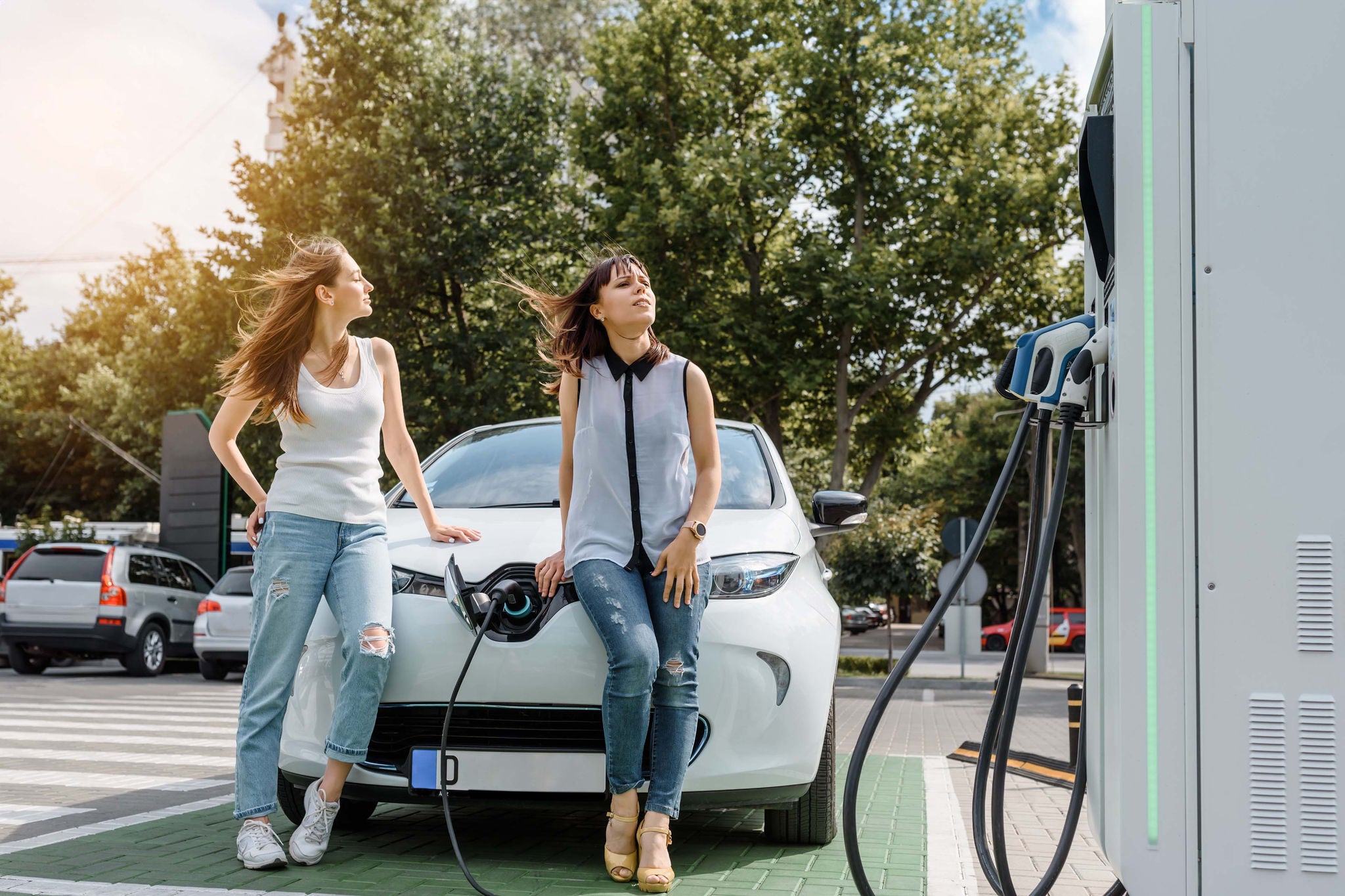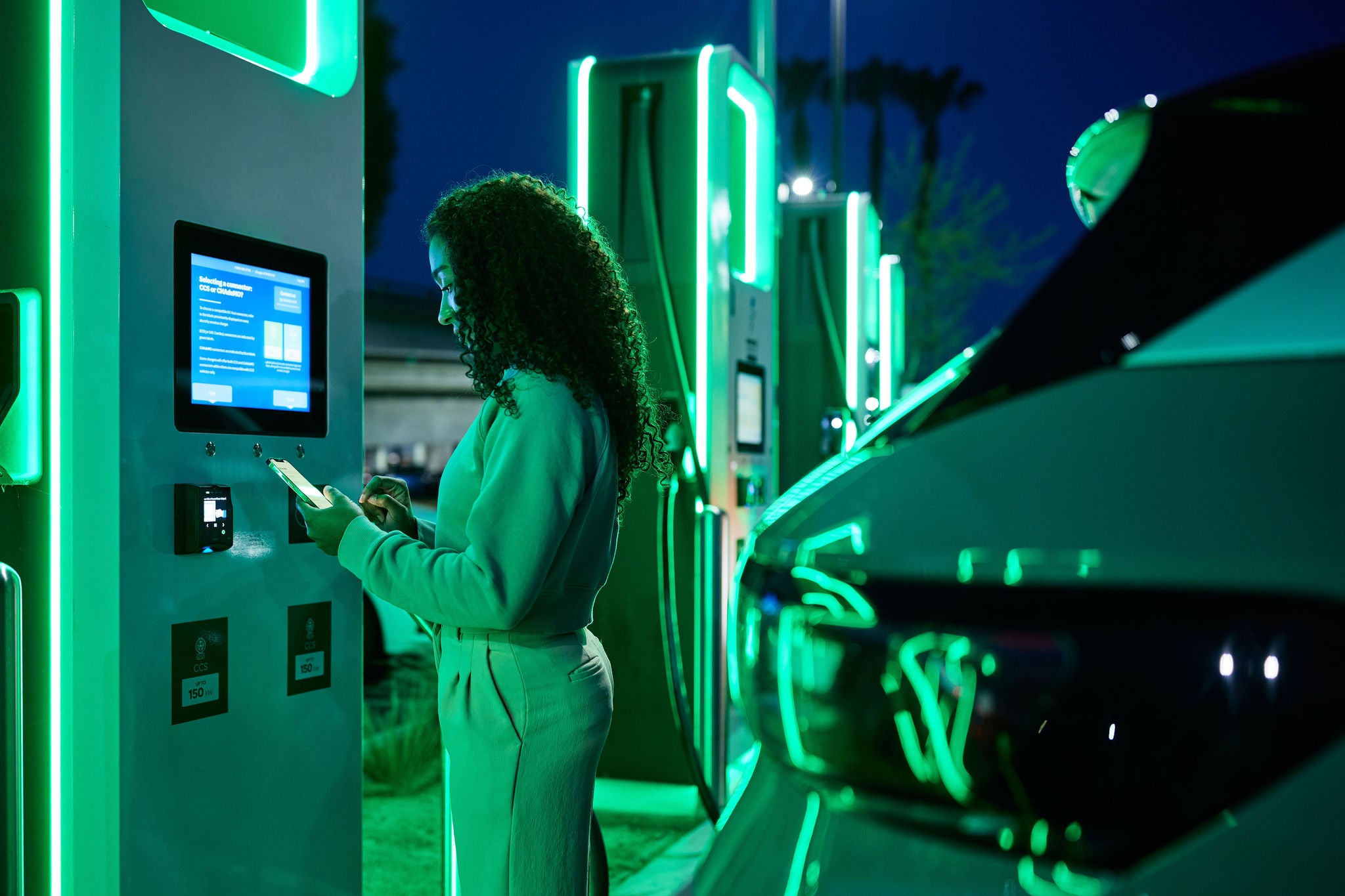EY refers to the global organization, and may refer to one or more, of the member firms of Ernst & Young Global Limited, each of which is a separate legal entity. Ernst & Young Global Limited, a UK company limited by guarantee, does not provide services to clients.
How IONITY’s finance function became a growth driver
Automation and standardization in the financial sector are helping IONITY bring climate-neutral travel to European roads.
The better the question
How did a modest finance function break new regulatory ground?
To drive growth and efficiency, IONITY’s CFO navigated international compliance with limited resources.
While on holiday with his family, Bernd Edelmann opted for an electric car to drive between Munich and Barcelona, a 14-hour trip that clocks above 1300 km. He was able to complete the drive without having to worry about running out of battery power in remote areas, thanks to the electric charging networks operated by IONITY. In a satisfying twist to the story, Edelmann is not only a customer of the network, he’s also the Chief Financial Officer (CFO) of the company.
IONITY, a relatively new player in the business world, has achieved remarkable success. The company was established in November 2017 as a collaborative effort among prominent car manufacturers with the aim of constructing a network of High Power Charging (HPC) along European motorways. This initiative was designed to advance the concept of electric mobility — the use of vehicles powered by electricity instead of gasoline or diesel — across Europe and particularly for long-distance routes. For the high-profile companies involved in supporting IONITY, this project represented a once-in-a-lifetime opportunity requiring substantial investment.
This case study tells the story of how IONITY is working with EY professionals to realize its vision of operating a finance function that could be as smart, lean and agile as possible. Managed services are being used to optimize processes but, more than that, they are being used to motivate IONITY’s people.
Overview of the company
Electric mobility was initially perceived as a concept suitable only for big cities, and the time required to charge electric cars on the go was considered too long to build an attractive business model around it. Yet, IONITY, a leading player in the electric vehicle (EV) charging industry, defied these challenges and successfully established a thriving business.
According to Edelmann:
- IONITY has expanded its network of HPC stations over 2,200 points across 24 countries, spanning from Sweden to Gibraltar in only two years. These stations are strategically spread out over 500 charging points, ensuring convenient access for EV owners.
- The company has developed rapid charging capability, enabling EVs to quickly replenish their battery levels. In only the time it takes to finish a cup of coffee, an IONITY charging station can fill an electric vehicle with 50 kilowatt (kW) hours of green electricity . This rapid charging capability is made possible by the station’s impressive charging capacity of 350 kW.
- IONITY has achieved efficient charging times due to high charging capacities at HPC stations. Depending on the specific vehicle and prevailing season, a vehicle can be fully charged in as little as 20 to 30 minutes, compared to a traditional municipal charging station which typically takes four and half hours to fully charge a vehicle with the same quantity of electricity using an output of around 11 kW.
When put against consumer demand and IONITY's own ambitions, this is only the beginning. By 2025, more than 7,000 charging points are expected to be operational at over 1,000 locations. Through partnerships with cafes, restaurants, hotels and shopping facilities, IONITY charging stations will seamlessly integrate into the driver’s daily routine and offer more than just fast and efficient charging. Drivers can conveniently charge their vehicles while also engaging in activities such as shopping, grabbing a cup of coffee, or visiting friends and family. These stations will provide a unique customer experience that combines effortless charging with opportunities for errands, socializing and leisure.
IONITY’s expansion draws investment
IONITY continues to grow rapidly, says Edelmann “The best thing about it is that through our growth, we are contributing to climate-friendly mobility in Europe. This has made us increasingly interesting for other investors in recent years – even outside the automotive industry," he adds.
The company was established with the backing of major automotive manufacturers from the US and Europe. In November 2020, a couple of leading automakers from the Far East joined, and a year later, a leading asset management firm became the first non-automotive industry shareholder.
This partnership resulted in a further investment of €700m, highlighting the company’s growth and potential in the market.
“Numbers are only the beginning and reflect early impact. IONITY’s unyielding pursuit of speed, accountability, transparency, quality, efficiency and effectiveness sets us apart. These are the traits that most young companies strive for but rarely attain” Edelmann says.
Unique challenges
The finance and control departments of companies with the scope of IONITY are usually well-staffed and handle everything from annual financial statements to tax returns.
Even though IONITY has the backing of major automotive companies, it must remain agile, fast, and focused in a dynamic market. IONITY is subject to the same tax and accounting rules as every other company, but has to account for 24 different European countries. Every day, IONITY and Edelmann must meet around 330 reporting and compliance obligations. At IONITY, all of this is done with a minimum number of people.
Between performance and flexibility
Despite this, Edelmann cannot and does not want to build up. "We would have to grow strongly in terms of personnel in order to build up a classic finance function that does all this itself. That doesn't make economic sense. In addition, we work in an environment that is constantly changing. We would spend a lot of time keeping an eye on all the changes and keeping ourselves up to date. Traditional organizational structures are simply too slow and too inflexible for us," says Edelmann.
Markets and regulations are changing rapidly, and new technologies require investment. Edelmann shares this challenge with many CFOs. Meanwhile, back-office processes are subject to mounting costs. A shortage of skilled personnel makes them expensive and increasingly difficult to retain. For five years, Edelmann and IONITY have been able to find a balance between performance and team-size flexibility with support from EY professionals.

The better the answer
Geared up for success: optimizing finance operations outcomes
IONITY uses an EY solution for financial processes. The principle: scale and outsource standard tasks, maintain responsibility and overview.
"From the very beginning, IONITY's vision was to operate a finance function that was as smart, lean and agile as possible, and wanted to break new ground. We at EY have been helping with this from day one, so to speak," says Carsten Rieger, Partner at Ernst & Young GmbH Wirtschaftsprüfungsgesellschaft.
It started with a small EY team that helped IONITY start initial processes and set up their finance department back in 2017, which took about a year. Then the implementation of the basic processes went into regular operation. By the end of 2018, financial operations were almost entirely handled by EY Managed Services, by outsourcing processes to the international network of the EY organization.
The principle idea is that in all relevant areas such as accounting, internal and external reporting, tax compliance, transfer pricing or payroll accounting, the global process owners of the EY teams take care of the tasks that arise with the support of local EY offices that are most familiar with the respective country-specific requirements. Depending on the requirements, up to 240 EY professionals in over 20 countries work for IONITY in an agile structure, continuously exchanging information across borders.
Cross-border and cross-competence work
In Germany, the Service Management Office (SMO) coordinates activities, integrates EY competence centers like EMEIA Tax Center, places professionals at IONITY for detailed questions, and distributes accounting activities to the nearshore network. A SMO also trains newly hired colleagues and consolidates the service areas of EY teams. Progress, areas of improvement and process adjustments are continually discussed with Edelmann's core internal team. Regular operation helps achieve stability, thereby eliminating faults for ongoing development and progress.
For Carsten Rieger, Head of Finance Operations Engagement for IONITY, it is important not to let the customer notice the complexity of this interface management. "Our offering in the area of Finance Operations is characterized by the fact that we are able to transfer an incredible variety of support services into an efficient service bundle through central coordination and technology. For the IONITY team, this means that they don't talk to as many contacts as possible, but to as few people as possible,” he says.
High flexibility required
Once set up, Rieger and his team wanted to provide IONITY with a high amount of flexibility. This is because, when a global investment company joined as a shareholder, the reporting requirements to which the team had to adapt naturally changed again – and they were able to do so due to the agile structure.
"Managed services is the opposite of blunt, inflexible outsourcing. IONITY is a good example of this. Over time, demands have changed, new shareholders have introduced new requirements in terms of traceability, detailed information, ERP connection and monthly reporting," says Rieger.
“EY services have always adapted to the short and eventful history of IONITY, both in scope and in the way they are executed. Together with IONITY, we have always found solutions and work together in a spirit of trust," he adds.
Bundle, scale, automate services
This specialized approach, based on the principle of managed services, does not mean that Edelmann has to relinquish responsibility. "I would never relinquish sovereignty over our reporting obligations and financial statements. However, with a partner like EY, I can very well maintain a flexible, cooperative and efficient system that is always up to date in terms of expertise and methodology. This is a good solution for our special situation as a joint venture in a fast-paced environment," says Edelmann.

The better the world works
Making the finance function as agile as possible
Managed services go beyond optimizing processes. They rely on people who can be reached.
Making the most efficient use of resources and courage to take new paths — these are two principles embodied in IONITY's finance function. In fact, Edelmann manages his finance department full-time with only a few employees and makes sure that IONITY is compliant with reporting and accounting obligations in 24 European countries where the firm is bringing tomorrow's mobility to the road.
For Rieger, the work is trendsetting. "CFOs and their teams want to concentrate on the essentials. And that's not administration. For our broad-based network of EY professionals, complex detailed work can be easily scaled these days. This benefits customers like IONITY, who are already digitally positioned and are looking for lean structures."
Leveraging technology is about more than responding to cost pressures
The possibility of automating financial processes through robotic process automation (RPA) and artificial intelligence makes managed service approaches possible for finance operations. And a more frequent need for this service in the short-term makes this approach increasingly attractive for joint ventures, start-ups or carve-outs.
For Edelmann, leveraging technology is a matter of attitude, not just an answer to cost pressure. "With our work, we are helping to create the mobility of tomorrow. We cannot do that with yesterday's methods. Living digitality is important, but in the end, the people at EY still have to enter into dialogue and deal constructively with critical situations. For me, working with EY depends heavily on personal contact – people business, in other words. Not everything can be controlled with dashboards and robots," says Edelmann.
Motivation cannot be digitized
Rieger agrees that the seemingly technical and procedural management discipline of managed services will continue to be about people in the future. "The decisive factor is not the processes, they are constantly changing anyway. What you can't digitize is the motivation of the people who are at work. IONITY is all about speed. If we weren't proactive, motivated and responsive in the short term, all the tools and finance use cases would hardly be worth anything."
In any case, for Edelmann and his team, the interaction between a person and machine brings relief from the burden of daily tasks that a finance and tax department have to cope with. And for all drivers, road trips through Europe are less stressful thanks to IONITY and electric mobility.
How EY can help
-
Our global compliance and reporting professionals can help your business achieve accuracy and efficiency in over 150 jurisdictions. Find out more.
Read more -
Discover how EY's finance consulting services can help your business capitalize on opportunities to drive profitable growth and drive transformative change.
Read more -
EY Finance and Accounting Managed Services teams can help your business keep pace with evolving regulation, technology and talent demands. Read more.
Read more



